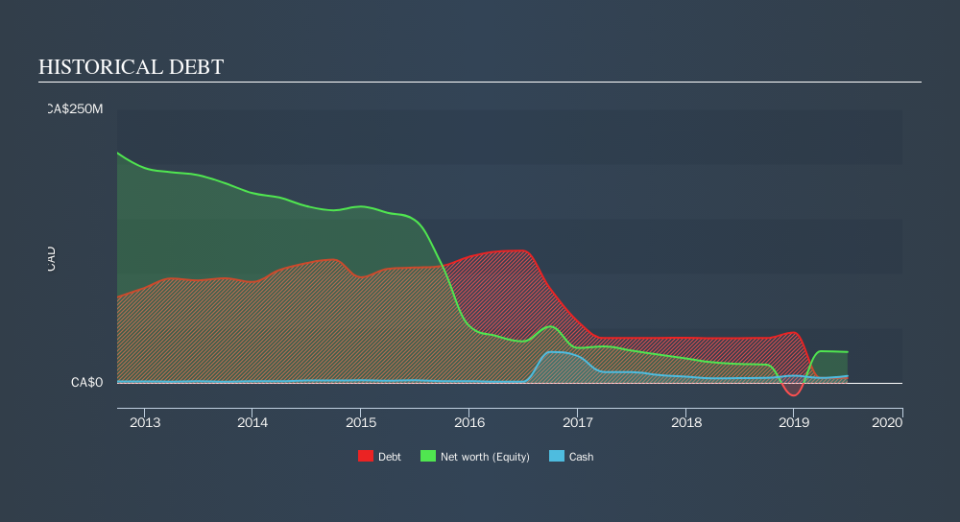Is Zargon Oil & Gas (TSE:ZAR) Using Too Much Debt?

David Iben put it well when he said, 'Volatility is not a risk we care about. What we care about is avoiding the permanent loss of capital.' When we think about how risky a company is, we always like to look at its use of debt, since debt overload can lead to ruin. Importantly, Zargon Oil & Gas Ltd. (TSE:ZAR) does carry debt. But the real question is whether this debt is making the company risky.
When Is Debt A Problem?
Debt is a tool to help businesses grow, but if a business is incapable of paying off its lenders, then it exists at their mercy. Ultimately, if the company can't fulfill its legal obligations to repay debt, shareholders could walk away with nothing. However, a more common (but still painful) scenario is that it has to raise new equity capital at a low price, thus permanently diluting shareholders. Of course, debt can be an important tool in businesses, particularly capital heavy businesses. The first step when considering a company's debt levels is to consider its cash and debt together.
Check out our latest analysis for Zargon Oil & Gas
What Is Zargon Oil & Gas's Debt?
The image below, which you can click on for greater detail, shows that Zargon Oil & Gas had debt of CA$4.62m at the end of June 2019, a reduction from CA$41.2m over a year. But on the other hand it also has CA$6.73m in cash, leading to a CA$2.11m net cash position.
How Strong Is Zargon Oil & Gas's Balance Sheet?
The latest balance sheet data shows that Zargon Oil & Gas had liabilities of CA$10.2m due within a year, and liabilities of CA$66.9m falling due after that. Offsetting this, it had CA$6.73m in cash and CA$2.23m in receivables that were due within 12 months. So it has liabilities totalling CA$68.2m more than its cash and near-term receivables, combined.
This deficit casts a shadow over the CA$9.08m company, like a colossus towering over mere mortals. So we'd watch its balance sheet closely, without a doubt After all, Zargon Oil & Gas would likely require a major re-capitalisation if it had to pay its creditors today. Given that Zargon Oil & Gas has more cash than debt, we're pretty confident it can handle its debt, despite the fact that it has a lot of liabilities in total. When analysing debt levels, the balance sheet is the obvious place to start. But you can't view debt in total isolation; since Zargon Oil & Gas will need earnings to service that debt. So when considering debt, it's definitely worth looking at the earnings trend. Click here for an interactive snapshot.
In the last year Zargon Oil & Gas actually shrunk its revenue by 20%, to CA$28m. We would much prefer see growth.
So How Risky Is Zargon Oil & Gas?
We have no doubt that loss making companies are, in general, riskier than profitable ones. And in the last year Zargon Oil & Gas had negative earnings before interest and tax (EBIT), truth be told. And over the same period it saw negative free cash outflow of CA$2.8m and booked a CA$4.8m accounting loss. But at least it has CA$6.7m on the balance sheet to spend on growth, near-term. Summing up, we're a little skeptical of this one, as it seems fairly risky in the absence of free cashflow. When I consider a company to be a bit risky, I think it is responsible to check out whether insiders have been reporting any share sales. Luckily, you can click here ito see our graphic depicting Zargon Oil & Gas insider transactions.
When all is said and done, sometimes its easier to focus on companies that don't even need debt. Readers can access a list of growth stocks with zero net debt 100% free, right now.
We aim to bring you long-term focused research analysis driven by fundamental data. Note that our analysis may not factor in the latest price-sensitive company announcements or qualitative material.
If you spot an error that warrants correction, please contact the editor at editorial-team@simplywallst.com. This article by Simply Wall St is general in nature. It does not constitute a recommendation to buy or sell any stock, and does not take account of your objectives, or your financial situation. Simply Wall St has no position in the stocks mentioned. Thank you for reading.

